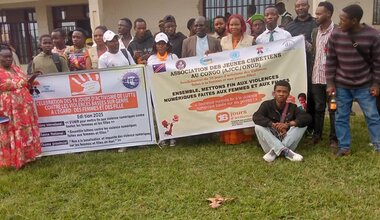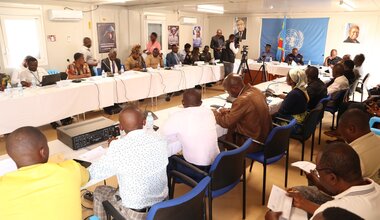MONUSCO determined to put an end to transhumance-caused repeated and violent clashes in the South-Kivu province
A meeting in which an ambitious inter-provincial project was revealed took place Wednesday 18 January 2017 at MONUSCO headquarters in Uvira. It was attended by national, provincial, and local authorities who strongly felt the need for an inter-community dialogue.
Uvira, 18 January 2017 – Insecurity in the South-Kivu, more particularly in the Territories of Fizi and Uvira is not only caused by the Maï Maï armed groups but also an alarming and recurrent new phenomenon “Transhumance”, which unfortunately has little coverage by the media. It is mainly about the movements of farmers along with their cows from one place to another, at the mercy of seasons in search for pasture lands. On their way, lots of devastations are caused on the crops resulting in local farmers’ wrath to react to what they consider to be impunity with involvement of armed groups. Called upon to intervene and restore calm, Police and FARDC members are oftentimes overwhelmed; many people are killed in clashes between the police and armed groups, such was recently the case in June 2016 in the district of Iseke, Territory of Fizi. Talks have been going on for years to attempt to solve the problem, without any success. The issue gets more complicated with the eminent personalities from all sections of life listed among the owners of the livestock: senior Army and Police officers; Provincial and Central Governments officials. It is a real international transhumance insofar large number of cows are poured in DRC from Tanzania, Rwanda and Burundi which share common borders with DRC for the purposes of trading and transit at entry points like Kiliba, Sange, Runingu, Katogota (in Territory of Uvira), Kilembwe or Lubonja (in Territory of Fizi).
As part of its mission to protect civilians, MONUSCO developed last November a six-prong strategy to put an end, or to mitigate the negative effects of the transhumance phenomenon. The aim of the UN Mission’s inter-provincial initiative, for Maniema and Tanganyika provinces, is to secure a larger involvement of the Congolese authorities at the provincial and local levels. The head of MONUSCO-Uvira Sub-Office, Ould Mohamed El Hacen, Project Initiator said the end-goal is “to bring the authorities to take ownership of the mechanism for sustainable resolution of this conflict which for years on end has caused lots of devastations.” The Project, which is on its third step, is intended to identify the root causes of the recurrent transhumant-caused violence and later on involve the local populations, the first victims, in an inclusive inter-community dialogue to help all the stakeholders to identify the root causes of the conflicts, to propose tips for way out and, above all, to have the local leaders and population take ownership of the momentum with a view to reducing the transhumance-related incidents by providing support to Government’s efforts through its specialized technical services, this is being its primary responsibility to guarantee farming activities.
The project also intends to reinforce the already existing protection and conflicts management mechanisms established by local authorities and MONUSCO’s partners which need reviving and ownership by local communities for an effective resilience. The same applies to the multiple initiatives on this matter:, for example, the famous Transhumance Agreement signed in September 2010 in Baraka by traditional Leaders and farmers that needs updating and revision in light of the current context and in line with the legal instruments in the matter.
Many community activities also planned as part of this project must be finalized within a month before in anticipation for the upcoming transhumance (May/June in September) : joint missions to the affected zones for sensitization to peaceful transhumance, capacity-building for the different actors (especially youth and women) on the protection and conflicts management tools. It is worth noting that this project is fully funded by MONUSCO in the amount of US$ 39,900 for a six-month period (November 2016-April 2017); it will provide support to the provincial Governments in Maniema, Tanganyika and South-Kivu within the framework of the Mission’s contribution to the execution of respective provincial Stabilization plans.
Jean-Tobie Okala
 UN
UN United Nations Peacekeeping
United Nations Peacekeeping






